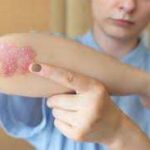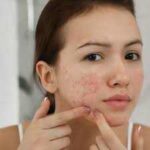Atopic dermatitis or Eczema is a skin condition that causes itchy, red, and inflamed skin. Eczema triggers can vary from person to person, but we have discussed some common ones below.
Eczema is an inflammatory skin condition, in which patches of skin become dry, itchy, and inflamed. It’s a common, non-contagious skin condition that might cause redness, rashes, and irritation to the skin. Eczema can affect people of any age, but in most cases, eczema symptoms appear in childhood and last into adulthood.
Symptoms of eczema include dry and sensitive skin, crusting or oozing, itchiness, and small raised bumps. It occurs differently on different skin tones, people with light skin tones can have red or purple eczema rashes, whereas, those with dark skin tones complain of eczema rashes in a brown or black colour.
The exact cause of eczema is still unknown; however, there are various environmental factors and allergens that lead to the development of eczema in the body. A person can suffer from more than one type of eczema.

Eczema has different types, some of them are atopic dermatitis, neurodermatitis, stasis dermatitis, and dyshidrotic eczema. Various treatment options are available for eczema, including topical steroids, home remedies, and medications that help reduce the symptoms and inflammation caused by eczema.
Eczema triggers
Eczema and its symptoms vary from person to person. Everyone diagnosed with this skin disease gets affected differently. You might experience eczema symptoms, at certain times of the year on different parts of your body.
Several things may trigger your eczema symptoms, and they may differ from those of another person.
What Triggers Eczema?
There are several triggers for eczema; some common ones include the following:
- Dry weather
Almost any kind of weather change, like cold, dry, humid, or hot can affect your eczema. It can act as a trigger for eczema symptoms because human bodies enjoy living at a consistent temperature. Therefore, with any elevation or decrease in the temperature of the atmosphere, skin experiences environmental damage and injury. It is highly advisable for people living with eczema to avoid direct exposure to prolonged heat or cold.
2. Scented products
For some people, fragrance can also become one of the reasons for eczema flare-ups. When applied to the body, scented products like soaps, lotions, perfumes, shower gels, and other personal care items, can irritate the skin and worsen eczema.

3. Fabric
Many people are sensitive to fabrics like wool or polyester, which irritate the skin and cause itchiness and redness. Therefore, one should avoid wearing clothes that can worsen the skin condition.
4. Food allergies
Certain food items might trigger eczema and be considered allergenic for some people. Allergies to milk, eggs, peanuts, and wheat have been identified as eczema triggers in some individuals. When you notice any connection between certain food items and eczema flares, you must talk to your doctor to see if eliminating those food items can help you get some relief.

5. Exercise
Doing any physical exercise is beneficial for physical and mental health. However, sweating a lot can trigger a flare in people living with eczema. Therefore, if you notice that your eczema flares after workout sessions, shift to low-intensity exercise and wipe your sweat more often during workouts.
How to Avoid Eczema Flares?
Triggers are the things that cause your skin to react, making it dry, itchy, flaky, and red. Eczema flare-ups can be managed by avoiding triggers.
- Try to identify the triggers, like dust, weather, and food allergies, that may cause your eczema to flare up, and avoid them as much as possible to reduce the symptoms of the disease.
- Do moisturise your skin regularly to avoid it becoming dry, as it is a common eczema trigger. Apply lotions to your skin when it is dry and reapply throughout the day as necessary.
- Reach out to soft fabrics such as cotton, or stick to any comfortable clothing, because fabrics like nylon and other synthetic blends may irritate your skin and trigger eczema.
- Try relaxation techniques like yoga, meditation, and deep breathing exercises to lower stress. Because anxiety and stress can make skin conditions like eczema worse.
CONCLUSION
Eczema is a common, non-infectious skin condition that may cause your skin to become dry, itchy, and scaly. It can appear anywhere in a person’s body and can affect children and adults. Flare-ups can be caused by various eczema triggers, which vary from person to person. We have detailed what triggers eczema and how to avoid them in detail.
For instance, an individual might experience flare-ups because of certain food allergies, while others can have them due to extreme hot and cold conditions. Therefore, it is essential to be aware of your eczema triggers and try to avoid them to keep your skin condition under control. We have discussed how you can avoid eczema triggers, and these tips will help you prevent flare-ups in the future.
If you’re struggling with managing your eczema, consult one of the renowned clinics- the Ayursparsh Clinic and Panchakarma Centre in Dharwad, Karnataka. Reach out to Dr. Rashmi Patil, who specialises in treating various skin conditions like eczema, psoriasis, and acne and will help you with all your skin concerns.




